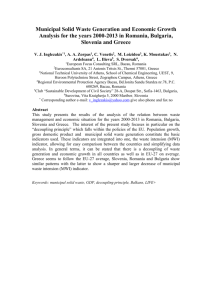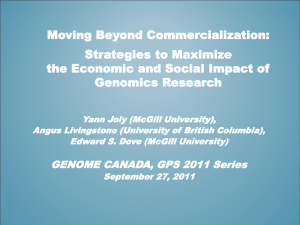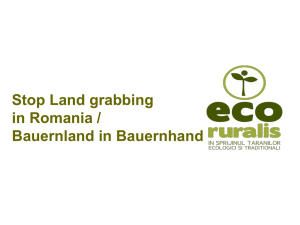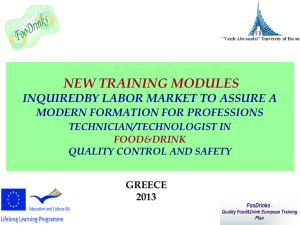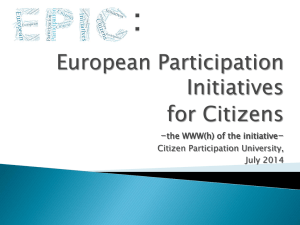Subject: Distribution of food products
advertisement
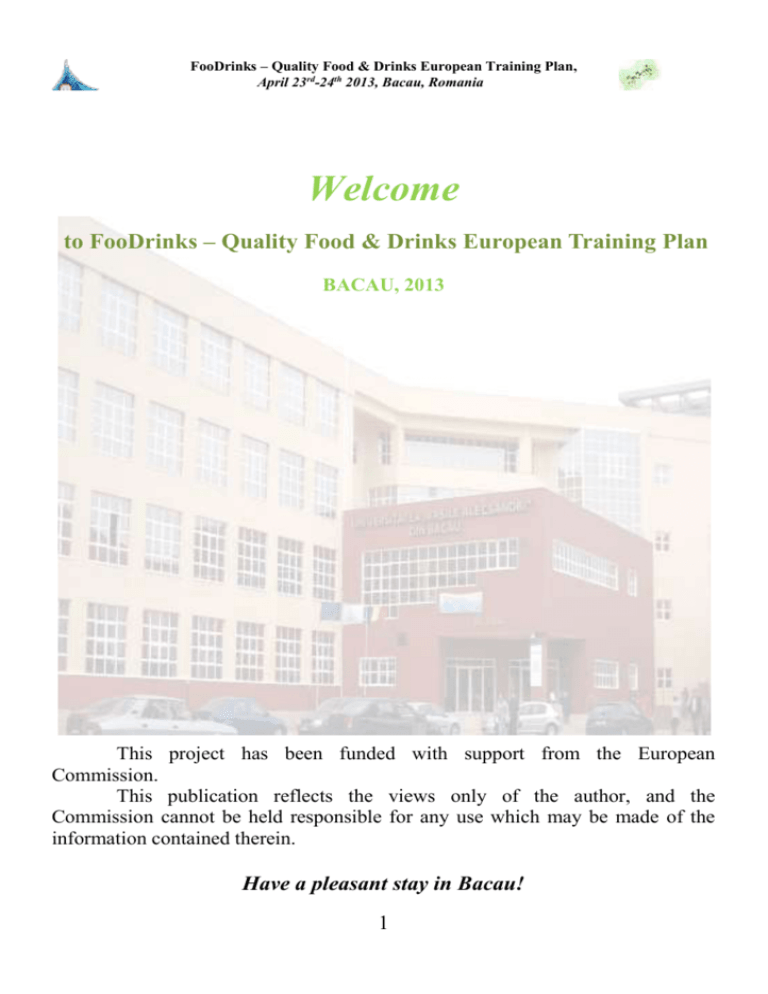
FooDrinks – Quality Food & Drinks European Training Plan, April 23rd-24th 2013, Bacau, Romania Welcome to FooDrinks – Quality Food & Drinks European Training Plan BACAU, 2013 This project has been funded with support from the European Commission. This publication reflects the views only of the author, and the Commission cannot be held responsible for any use which may be made of the information contained therein. Have a pleasant stay in Bacau! 1 FooDrinks – Quality Food & Drinks European Training Plan, April 23rd-24th 2013, Bacau, Romania 2 FooDrinks – Quality Food & Drinks European Training Plan, April 23rd-24th 2013, Bacau, Romania UNIT LEARNING Name of the qualification: Technician/technologist in food&drink quality control and safety NQF EQF level 4 Level4 BG , RO, HU, FR, GR, TR , ES . Technical post-secondary training Name of the Unit: 1st Module: New sustainable technology and production in Food Industry Process Distribution Energy and water savings Process efficiency Green packaging Byproduct valorization The aim of the Unit is to convey Learning outcomes - knowledge, skills and competence, in accordance with latest news in scientific and technical fields: PROCESS Discipline contributes to train specialists in quality and food safety; It aims knowing, understanding of concepts, of basic theories and methods of the field and of specialization area, suitable use in professional communication. DISTRIBUTION Discipline provides a set of theoretical and practical knowledge in the field of food distribution, necessary for future specialists in quality control and food safety, in accordance with labor market requirements. ENERGY AND WATER Discipline built the knowledge and skills of tradespeople and professionals to support improved energy efficiency practices, products and services. 3 FooDrinks – Quality Food & Drinks European Training Plan, April 23rd-24th 2013, Bacau, Romania PROCESS EFFICIENCY Discipline offers a set of theoretical and practical knowledge in the field of food process efficiency necessary for a modern trainings of specialists practicing in quality control and food safety; It aims at implementing the most modern methods and techniques to increase the efficiency of the processes in the food industry. GREEN PACKAGING Descipline provides the basics of green packaging, sustainability and knowledge how to use the recycled packaging materials. BYPRODUCT VALORIZATION Discipline offers a set of theoretical and practical knowledge in valorization of byproducts technologies from food industry, necessary for future specialists who will access the posts in country and the European labor market; It is aimed the implementation of the most modern methods and techniques of processing by-products of the food industry and obtaining new products. LEARNING OUTCOMES He/ she is able to... Knowledge He/she knows/ is familiar with ... To identify and to describe the working schemes of different branch of food processing industry; To know the measures which ensure environmental protection; To indicate the Skills He/she can/tests ... To conduct specific activities for technological control on different production stages; To use working techniques and codes of the best practices for food production with innocuity; 4 Competence He/she is responsible for/supervises To be able to supervise the food production chain with sustainability; To be able to plan and calculate the amount of needed materials; To be able to understand and to FooDrinks – Quality Food & Drinks European Training Plan, April 23rd-24th 2013, Bacau, Romania necessary measures for energy and water saving used in food industry; To estimate the appropriate procedures for a high level of process efficiency; To distinguish the best materials the best conditions for green packaging; To explain principles and methods for determining the of raw materials and finished products characteristics for food processing industry; To identify the methods for byproducts valorization; To indicate the suitable measures for storing and distribution conditions of food products. To carry out tests to establish indices and technological properties To monitor the application of measures which ensure environmental protection; To perform sensory and physical - chemical analysis for raw materials, auxiliaries, finished products and byproducts. 5 resolve technical problems which could appear during the process; To be able to carry out economic calculation and quality control for food safety; To be able to organize the collection, the storing and elimination of wastes; To be able to organize the recycling of byproducts FooDrinks – Quality Food & Drinks European Training Plan, April 23rd-24th 2013, Bacau, Romania Name of the qualification: Technician/technologist in food&drink quality control and safety NQF EQF level 4 Level4 BG , RO, HU, FR, GR, TR , ES . Technical post-secondary training Name of the Unit: 2nd Module: Practical Application Rules on the Food Industry Chain of Value Standard regulations on key issues like packaging (food contact materials), logistics Implementation of the standards in the food chain Practical training sessions The aim of the Unit is to convey Learning outcomes - knowledge, skills and competence, in accordance with latest news in scientific and technical fields: STANDARD REGULATIONS ON KEY ISSUES LIKE PACKAGING (FOOD CONTACT MATERIALS), LOGISTICS Descipline provides basics how to develop and improve the knowledge and skills of tradespeople and professionals in the field of legislation and regulations related to the food industry and food chain and provides information how to stimulate new skills and expertise in the food industry related to legislation and regulation issues in order to enhance productivity and competitiveness. IMPLEMENTATION OF THE STANDARDS IN THE FOOD CHAIN Disciplin ensures a broad understanding of food safety and HACCP furthermore it explains the HACCP relationship with industrial hygiene and food product safety and provides an understanding of food safety matters and associated legal requirements. PRACTICAL TRAINING SESSIONS 6 FooDrinks – Quality Food & Drinks European Training Plan, April 23rd-24th 2013, Bacau, Romania 7 FooDrinks – Quality Food & Drinks European Training Plan, April 23rd-24th 2013, Bacau, Romania 8 FooDrinks – Quality Food & Drinks European Training Plan, April 23rd-24th 2013, Bacau, Romania PROCESS Subject: Process Instructor: Term: ECTS Points: 1. The aim of the course Discipline contributes to train specialists in quality and food safety. It aims knowing, understanding of concepts, of basic theories and methods of the field and of specialization area, suitable use in professional communication. 2. Competence She/he is able to: supervise the food production chain with sustainability; plan and calculate the amount of needed materials; understand and to resolve technical problems which could appear during the process; carry out economic calculation and quality control for food safety; organize the collection, the storing and elimination of wastes; organize the recycling of byproducts. 3. Course description Technological process represents all the mechanical, physical, chemical operations, that by simultaneous or successive action transforms raw materials into goods. The manufacturing process represents all the processes used to transform raw materials and semi-products into finished products. Food industry, studies the technological processes by which vegetable and animal raw materials are transformed into foods, that are finished products of food industry. 1) Technological process, technology. Process (evolution in time and / or space of a given system); 9 FooDrinks – Quality Food & Drinks European Training Plan, April 23rd-24th 2013, Bacau, Romania 2) 3) 4) 5) 6) 7) Technology (all knowledge of the processes and means used to achieve a production in an organized and rational way); Technological process (steps performed by raw materials until processing them into finished products); Technological flow, technological scheme. Technological flow; Technological block scheme; Conventional symbols; Technological plan; Technological installation. Unit Operations Concept unit operation; Technological process - unit operations; Main phenomenon (basic) - unit operation; Dimensional analysis, international measurement system. Raw materials from agro-food industry Organoleptic analysis; Physical-chemical analysis; Micro-biological analysis; The importance of raw materials on process and process efficiency from agro-food industry. Mechanical operations Storage and transport of solid materials; Batching of granular materials; Milling of solids; Classing (screening). Hydrodynamical operation (momentum transfer). Transport of liquids; Compression and transport of gases; Mixing (stirring); Sedimentation; Filtration; Centrifugation Thermal operations (heat transfer). Heating and cooling; 10 FooDrinks – Quality Food & Drinks European Training Plan, April 23rd-24th 2013, Bacau, Romania Boiling and condensation; Distillation and rectification. 8) Diffusion operations (mass transfer) Absorption; Adsorption; Extraction. 9) Chemical and biochemical process The mechanism of the process; Composition of the mass reaction; The degree of transformation; primary equations for material balance. 10) Driving force of process chemistry and biochemistry manufacturing / key stage determined by the speed of the process Equilibrium process; Reaction kinetics; Procedures for activating chemical and biochemical reactions; Catalysis and catalysts; Technological enzymology -enzymatic catalysis. 11) Equipments for structural changes Biochemical reactor, bioreactor; Types of bioreactors, 4. Course requirements Basic knowledge in the field of food industry. 5. Text, readings, materials used The lecture using modern tools such as video projection and rear projection of images, explanation, debate, study of curriculum documents and bibliography 6. Grading method Evaluation form: Written and oral exam Minimum conditions for promotion 11 Conditions for obtaining FooDrinks – Quality Food & Drinks European Training Plan, April 23rd-24th 2013, Bacau, Romania (5 note) Active presence to lecture and laboratory – 20%,Evaluation of the laboratory activity – 20% Answers to exam – 60% maximum note (10 note) Active presence to lecture and laboratory – 10%,Evaluation of the laboratory activity – 20% Answers to exam – 70% 12 FooDrinks – Quality Food & Drinks European Training Plan, April 23rd-24th 2013, Bacau, Romania DISTRIBUTION OF FOOD PRODUCTS Subject: Distribution of food products Instructor: Term: ECTS Points: 1. The aim of the course Discipline provides a set of theoretical and practical knowledge in the field of food distribution, necessary for future specialists in quality control and food safety, in accordance with labor market requirements. 2. Competence She/he/ be able/ to: supervise the food production chain with sustainability; plan and calculate the amount of needed materials; to be able to supervise the storage conditions of food products; carry out economic calculation and quality control for food safety. 3. Course description Food distribution is the circuit that food products go to reach from the production stage to the consumption stage. In the food distribution should not be ignored the aspects of packaging, storage and preservation of food per unit production, suitable transport conditions according to the product transported, as well as by creating the storage conditions to beneficiary. Another aspect that is part of the food distribution is related to accompanying documents (documents that certify the quality and accounting and financial documents) 1. Complex content of distribution 2. Food packaging Packaging material used, according to the nature of food product; Interaction package- product; 13 FooDrinks – Quality Food & Drinks European Training Plan, April 23rd-24th 2013, Bacau, Romania Package toxicity; Mathematical models used in packaging for package saving; Package design. 3. Preservation / storage of finished food products Preservation techniques applied finished food products; Food storage, ensuring conditions and spaces according to specifics of products and European legislation. 4. Food transport Ensuring transport conditions according to the nature of food product 5. The storage to beneficiary Ensuring suitable conditions in storages and shops 6. Functions and costs of food distribution. Advantages of specialized distribution. 7. Distribution circuits Circuits types Choice of distribution channels Systems and food distribution channels 8. Food market launch Market launch forms used by food manufacturers 9. Food markets The social and economic role of food markets Food markets types Production markets Wholesale markets Food produce exchanges 10. Wholesale and retail distribution of food products Wholesale trade of food products Retail trade of food products 11. The reform of food distribution system in European Union International markets inside and outside of UE Legislation of final distribution country; national legal requirements 14 FooDrinks – Quality Food & Drinks European Training Plan, April 23rd-24th 2013, Bacau, Romania 4. Course requirements Basic knowledge in the field of food industry. 5. Text, readings, materials used The lecture using modern tools such as video projection and rear projection of images, explanation, debate, study of curriculum documents and bibliography 6. Grading method Evaluation form: Oral exam Minimum conditions for promotion (5 note) Active presence to lecture and laboratory – 20% Evaluation of the laboratory activity – 20% Answers to exam – 60% 15 Conditions for obtaining maximum note (10 note) Active presence to lecture and laboratory – 10% Evaluation of the laboratory activity – 20% Answers to exam – 70% FooDrinks – Quality Food & Drinks European Training Plan, April 23rd-24th 2013, Bacau, Romania PROCESS EFFICIENCY Subject: Process efficiency Instructor: Term: ECTS Points: 1. The aim of the course Discipline offers a set of theoretical and practical knowledge in the field of food process efficiency necessary for a modern trainings of specialists practicing in quality control and food safety. It aims at implementing the most modern methods and techniques to increase the efficiency of the processes in the food industry. 2. Competence He/she is able to: supervise the food production chain with sustainability; plan and calculate the amount of needed materials; carry out economic calculation and quality control for food safety; organize the collection, the storing and elimination of wastes; 3. Course description Increasing the efficiency of the chemical and biochemical processes, results from a necessity because food processes have to satisfy the growing demands of quality, of saving raw materials, energy and respect for our environment. 1) Fundamental notions of physical, chemical and biochemical process. The notion of physical, chemical and biochemical process; The notion of a unitary process and biotechnical/technological process; 2) Relationship process equipment in food technology 16 FooDrinks – Quality Food & Drinks European Training Plan, April 23rd-24th 2013, Bacau, Romania Technological phase / equipment; Main technological stage / main equipment; 3) Manufacturing processes of the raw materials in the food industry. Physical processing (mechanical processing, heat treatment, radiation processing); Chemical processing (chemical sterilization, fermentation, chemical processing); Physico-chemical processes of mass transfer, heat transfer , momentum transfer, mixt transfer); 4) Increasing the processes efficiency in the food industry using new technologies without obsolescence. 5) Increasing the processes efficiency in the food by processing of byproducts. 6) Increasing the processes efficiency in the food industry using methods and intensification technology by fluidized bed. Principle of fluidized bed; Specific equipment to intensify the processes using fluidized bed; Using of fluidized bed in food processes; Intensification of dry processes using fluidised bed. 7) Increasing the processes efficiency in the food industry using ultrasound intensification. General notions on ultrasound; Using of ultrasound in food processes. 8) Increasing the processes efficiency in the food industry using microwave processing. General notions on microwaves; Using of microwaves in food processes. 9) Increasing the processes efficiency in the food industry using athermal minimal processing. Relationship temperature- thermal degradation of some raw materials and finished food products; Application of athermal processes in the food industry and processing efficiency. 10) Increasing the processes efficiency in the food industry using high pressures processing. 17 FooDrinks – Quality Food & Drinks European Training Plan, April 23rd-24th 2013, Bacau, Romania Relationship pressure- conversion of raw materials to finished products; Application of high pressures processing in the food industry. 11) Increasing the processes efficiency in the food industry using supercritical fluid processing. Notion of supercritical fluid, properties; Application supercritical fluid processing in food industry (oil extractions). 12) Raw materials and process efficiency in agro-food industry 4. Course requirements Basic knowledge in the field of food industry. 5. Text, readings, materials used The lecture using modern tools such as video projection and rear projection of images, explanation, debate, study of curriculum documents and bibliography 6. Grading method Evaluation form: Written and oral exam Minimum conditions for promotion (5 note) Active presence to lecture and laboratory – 20% Evaluation of the laboratory activity – 20% Answers to exam – 60% 18 Conditions for obtaining maximum note (10 note) Active presence to lecture and laboratory – 10% Evaluation of the laboratory activity – 20% Answers to exam – 70% FooDrinks – Quality Food & Drinks European Training Plan, April 23rd-24th 2013, Bacau, Romania BYPRODUCT VALORIZATION Subject: Byproduct valorizat ion Instructor: Term: ECTS Points: 1. The aim of the course Discipline offers a set of theoretical and practical knowledge in valorization of byproducts technologies from food industry, necessary for future specialists who will access the posts in country and the European labor market. It is aimed the implementation of the most modern methods and techniques of processing by-products of the food industry and obtaining new products. 2. Competence She/he/ be able/ to: supervise the food production chain with sustainability; understand and to resolve technical problems which could appear during the process; carry out economic calculation and quality control for food safety; organize the collection, the storing and elimination of wastes; organize the recycling of byproducts 3. Course description Realization of bio-products from different food byproducts is a priority in improving processes having an high impact to enhance quality of life. By-products from the food industry due to the high content in active ingredients is a rich raw material for making other biological products of interest for food, industrial, pharmaceutical, livestock and agricultural field. 1. Valorisation of byproducts from milling and bakery industry Valorisation of bran in bakery industry; Valorisation of bran for fodder purposes; Valorisation of byproducts to obtain the wheat germs; Valorisation of byproducts in order to obtain starch; 19 FooDrinks – Quality Food & Drinks European Training Plan, April 23rd-24th 2013, Bacau, Romania Valorisation of byproducts in order to obtain alcohol. 2. Valorization of byproducts from dairy industry Valorization of byproducts from dairy industry to obtain protein concentrates Obtaining the whey protein concentrate Valorization of byproducts from dairy industry to obtain casein and caseinates Valorization of byproducts from dairy industry to obtain lactose, in order to obtain products that mimic breast milk, preparing food products for diabetics, additives in fruit juices and vegetable powder, to obtain chewing gums, support for antibiotics or other drugs, ingredient in the composition of fermentation mediums in antibiotics industry, to obtain whey biomass used in bakery, meat industry, to obtain food for children, getting flavoring products, etc. Valorization of whey for obtaining metabolite from fermentation of whey: alcohol, acetic acid, vitamin B12, vitamin B2, etc. Valorization of buttermilk to obtain fermented buttermilk powder used in soft drinks, Valorization of buttermilk to obtain sweet buttermilk powder used in baking industry - increasing protein content, making bread acloride. 3. Valorization of by-products from beer industry Manufacture of bakery yeast and yeast feed; Valorisation of byproducts and malt flour manufacture; Valorisation of byproducts for the delivery of malt germs; Valorisation of brewers grains with obtaining materials for feeding; Valorisation of byproducts by making fertilizer products. 4. Valorization of by-products from fermentation industry Valorization of grape marc and making products with different alcoholic; Valorization of grape bunches by obtaining metabolites, tartaric acid, etc; Valorization of wine yeast to obtain metabolites, protein and vitamine preparations for animals; Valorization of waste from wine industry for production of tannins; 20 FooDrinks – Quality Food & Drinks European Training Plan, April 23rd-24th 2013, Bacau, Romania 5. 6. 7. 8. Valorization of waste and production of special products, antioxidants; Valorization of waste in livestock and / or agriculture. Valorization of by-products from meat industry Valorization of raw skins; Valorization of ferments and endocrine glands to be sent in pharmaceutical processing centers in order to obtain some metabolites such as growth hormones; Valorization of horny material by manufacturing household or handicraft products;; Valorization of bones and horny material by manufacturing glues; Valorization of blood by stabilization technologies, defibrillation, separation and preservation; Valorization of by-products from the fish industry Valorization of fish liver by obtaining medicinal oil; Valorization of by-products from the fish industry to obtain protein hydrolysates; Valorization of by-products for obtaining flour and fish oil; Valorization of by-products for obtaining of fish glue. Valorization of by-products from the processing of fruits and vegetables. Valorisation of by-products to obtain pectin, then used in the food industry; Valorisation of by-products by making gelled products; Valorisation of seeds and obtaining of oils; Valorisation of by-products by obtaining distillate alcoholic products; Valorisation of by-products for production of natural colorants. Valorization of by-products from sugar industry Valorisation of beet pulp in order to obtain metabolites and use for feed Valorisation of molasses in order to obtain alcohol; Valorisation of by-products by manufacture of glucose, fructose, dextrin and dextrose; Valorisation of spent sugar- beet pulp, to obtain acid hydrolysis for fodder yeast; 21 FooDrinks – Quality Food & Drinks European Training Plan, April 23rd-24th 2013, Bacau, Romania 9. Valorization of by-products from vegetable oil industry Valorisation of grist (of cakes resulted after extraction by pressing oil); Valorisation of waste and obtaining lecithin; Valorisation of shell oilseeds in order to obtain fuel materials; Valorisation of by-products for the production of biofuels. 10. Valorization of by-products from olive oil industry Valorisation of spent olives as foodstuff for livestock ; Valorisation of spent olives as fuel Valorisation of spent olives as compost Valorisation of waste and obtaining lecithin; 4. Course requirements Basic knowledge in the field of food industry. 5. Text, readings, materials used The lecture using modern tools such as video projection and rear projection of images, explanation, debate, study of curriculum documents and bibliography 6. Grading method Evaluation form: Oral exam Minimum conditions for promotion (5 note) Active presence to lecture and laboratory – 20%; Evaluation of the laboratory activity – 20% Answers to exam – 60% Conditions for obtaining maximum note (10 note) Active presence to lecture and laboratory – 10%; Evaluation of the laboratory activity – 20% Answers to exam – 70% 22 FooDrinks – Quality Food & Drinks European Training Plan, April 23rd-24th 2013, Bacau, Romania PRACTICAL TRAINING SESSIONS Subject: Practical training sessions Instructor: Term: ECTS Points: 1. The aim of the course Through practical activity aims to: familiarize students with the companies of chemical and biochemical profile, identifying links between theoretical and practical knowledge introduction to the complex issues of their activities, to develop intellectual skills: independent study, making a practical, portfolio, to develop communication skills and orientation in real space of a company profile, forming critical-reflective thinking, to stimulate the expression and argumenting of personal views concerning the practical reality. 2. Competence He/she can/tests to: comply with and enforce financial and administrative regulations; carry out the regulations of the management in accordance with the existing standards; understand the operation of special equipments/devices; implement the necessary tools and procedures for control of quality and safety processes; 3. Course description 1. Performing of briefing on the rules of Safety and Health at Work; 2. Company organization; 3. Technological organization of production sections to achieve finished products specific establishment; 4. Students will study will follow together with qualified persons the installation and technology flows to registration under normal working 23 FooDrinks – Quality Food & Drinks European Training Plan, April 23rd-24th 2013, Bacau, Romania 5. 6. 7. 8. 9. 10. parameters, will contribute to the notification causes deviations from technological regimes and how to remove them; Students will follow together with qualified personsl the control of parameters of technological phases, will record the measurement and control equipment, and how and efficiency in the good functioning of the equipment, section, technological process; Students must prepare practice notebooks that will include: company presentation, organization of society, technological process description, process flow diagram, the main processes occurring and major operations, eg. physico-chemical processes, processes of extraction, separation, purification, concentration (rectification where necessary), special heat treatments (eg. heating or cooling), biochemical processes, microbiological and biochemical implications on product, analysis methods and flow control; Will be pursued processes, guarantee period; Will be pursued concepts regarding quality assurance of products; It will be pursued closely the laboratory activities for control of raw materials, intermediate products of the technological manufacturing, of finished products, allowing execution of tests with a high degree of accuracy; Students will perform additional documentation for modernized processes, especially when there are in units new technological phase (to improve quality and cost price declines). 4. Course requirements Basic knowledge in the field of food industry. 5. Text, readings, materials used Activity of technological practice in an enterprise of profile. 6. Grading method Evaluation form: Oral exam 24 FooDrinks – Quality Food & Drinks European Training Plan, April 23rd-24th 2013, Bacau, Romania ENERGY AND WATER SAVINGS Subject: Energy and water savings Instructor: Term: ECTS Points: 1. The objectives of the course To built the knowledge and skills of tradespeople and professionals to support improved energy efficiency practices, products and services. To stimulate new energy efficiency jobs and add energy efficiency skills to existing jobs by supporting innovation, workforce development and sustainable business growth. Description of different distribution methods and means related to different methods of energy and water saving 2. Competences He/ be able to: To be able to plan and calculate the amount of needed materials; To be able to understand and to resolve technical problems which could appear during the process To be able to organize the collection, the storing and elimination of wastes; 3 . Course Description The course covers: up-to-date information, statistics and data on energy and water savings how to effectively deliver advice that customers will act on - key competencies and best practices theoretical and practical exercises. 25 FooDrinks – Quality Food & Drinks European Training Plan, April 23rd-24th 2013, Bacau, Romania The courses will cover the key measures in energy efficiency: 1. 2. 3. 4. 5. 6. 7. Climate change Insulation Heating systems Heating controls Appliances Consumer electronics Lighting 8. 9. 10. 11. 12. 13. Renewable technologies Grants and discounts Personal transport Water efficiency Housing types Building regulations and planning law. 4. Course Requirements General Certificate of Education Basic knowledge in the field of environmental studies. 5.Text, Readings, Materials used The module includes class room teaching and field work. Field experience is one of the most effective learning tools for environmental concerns. This moves out of the scope of the text book mode of teaching into the realm of real learning in the field, where the teacher merely acts as a catalyst to interpret what the student observes or discovers in his/her own environment. Course material provided by instructors for classroom teaching and field activities be utilized. 6. Grading Method Evaluation form: Written Exam Grades are according to the national evaluation system. Minimum conditions for promotion (5 note) Active presence to lecture – 30% Answers to exam – 70% 26 Conditions for obtaining maximum note (10 note) Active presence to lecture and laboratory – 20% Answers to exam – 80% FooDrinks – Quality Food & Drinks European Training Plan, April 23rd-24th 2013, Bacau, Romania GREEN (OR SUSTAINABLE) PACKAGING Subject: Green (or sustainable) packaging Instructor: Term: ECTS Points: 1. The objectives of the course to provide the basics of green packaging, sustainability how to use the recycled packaging materials description of using bio-polymers; renewable sources and biodegradable sources to know what life cycle assessment means to provide outlooks for the future 2. Competences He/she be able to: To be able to understand and to resolve technical problems which could appear during the process To be able to organize the collection, the storing and elimination of wastes; To be able to organize the recycling of byproducts 3 Course Description Green Packaging is course that provides a comprehensive review of sustainable packaging solutions, and how it affects various applications. This course reviews the following: Recycled materials (bio-based renewable or non-renewable), which encourages waste reduction and the conservation of resources; Post-consumer recovered materials supports an ethic of stewardship, supports the development of markets, and is an essential part of developing near closed loop systems. 27 FooDrinks – Quality Food & Drinks European Training Plan, April 23rd-24th 2013, Bacau, Romania Bio-based renewable materials from well-managed sources reduces dependence on non-renewable resources, uses current photosynthesized carbon to create raw materials that have the potential to be greenhouse gas neutral, and encourages more sustainable management of these resources. Bio-degradable (compostable) materials that can be returned to the earth, decomposing into natural byproducts. Content: 2. Use of minimal materials – reduced packaging, reduced layers of packaging, lower mass (product to packaging ratio), lower volume 3. Logistics efficiency (through complete life cycle) – cube utilization, tare weight, enablement of efficient transportation 4. Energy efficiency, total energy content and usage, use of renewable energy 5. Recycled content – as available and functional 6. Recyclability – recovery value, use of materials which are frequently and easily recycled, reduction of materials which hinder recyclability of major components 7. Reusability of packaging – repeated reuse of package, reuse for other purposes 8. Use of renewable resources in packaging 9. Use of biodegradable materials – when appropriate and do not cause contamination of the recycling stream 10. Avoid the use of materials toxic to humans or the environment 11. Effects on atmosphere/climate – ozone layer, greenhouse gases (carbon dioxide and methane), volatile organic compounds 12. Water use, reuse, treatment, waste 13. Worker impact: occupational health, safety, clean technology 14. Impact of emissions from food waste and spoilage 4. Course Requirements General Certificate of Education No prerequisites are required. 28 FooDrinks – Quality Food & Drinks European Training Plan, April 23rd-24th 2013, Bacau, Romania 5.Text, Readings, Materials used As this course is Instructor-led the course material provided by instructors for classroom teaching and field activities be utilized. 6. Grading Method Evaluation form: Written and oral exam Grades are according to the national evaluation system. Minimum conditions for promotion (5 note) Active presence to lecture – 40% Answers to exam – 60% 29 Conditions for obtaining maximum note (10 note) Active presence to lecture – 20% Answers to exam – 80% FooDrinks – Quality Food & Drinks European Training Plan, April 23rd-24th 2013, Bacau, Romania STANDARD REGULATION ON KEY ISSUES OF THE FOOD CHAIN Subject: Standard regulation on key issues of the food chain (packaging, food contact materials, etc.) Instructor: Term: ECTS Points: 1. The objectives of the course To develop and improve the knowledge and skills of tradespeople and professionals in the field of legislation and regulations related to the food industry and food chain To stimulate new skills and expertise in the food industry related to legislation and regulation issues in order to enhance productivity and competitiveness. Introduction of regional, national and international food industry legislation procedures 2. Competences He/she be able to: To be able to use and implement existing regulations in planning and production of food To be able to understand regulations and take them into account whilst production of materials and products 3.Course Description The course covers: up-to-date information on existing legislation and regulations instructions on using the legal background at national and international levels theoretical and practical examples, case studies The courses will cover the key measures of food production and safety legislation 1. Key issues of the food strategy of the EU – „from farm to fork” 30 FooDrinks – Quality Food & Drinks European Training Plan, April 23rd-24th 2013, Bacau, Romania 2. Uniformity – diversity (EU, member states – common and different regulations) 3. Common food legislation 4. Regulation EC/178/2002 – traceability of food production 5. HACCP (Hazard Analysis and Critical Control Points) 6. BTSF (Better Training for Safer Food) 7. Principles of food related legislation 8. Risk assessment 9. Food Safety (Green Paper on European Food Law ,1997) 10. Food labelling 11. National legislation in member states (overlie, focusing on the diversity) 12. EFSA – European Food Safety Authority 13. Introduction of new product to national and international markets 14. Establishment and management of food related businesses 15. Rules of responsibility (national and international levels), product recall 16. National legislation (different in each country the course is held in) and authorities 4. Course Requirements General Certificate of Education. Basic knowledge in the field of food industry legislation 5.Text, Readings, Materials used The module consist of theoretical lectures and examination of case studies 6. Grading Method Evaluation form: Written Exam Grades are according to the national evaluation system. Minimum conditions for promotion Conditions for obtaining (5 note) maximum note (10 note) Active presence to lecture – 30% Active presence to lecture and Answers to exam – 70% laboratory – 20%Answers to exam – 80% 31 FooDrinks – Quality Food & Drinks European Training Plan, April 23rd-24th 2013, Bacau, Romania IMPLEMENTATION OF THE STANDARDS IN THE FOOD CHAIN Subject: Implementation of the standards in the food chain Instructor: Term: ECTS Points: 1.The objectives of the course Ensure a broad understanding of food safety and HACCP. Explain the HACCP relationship with industrial hygiene and food product safety. Provide an understanding of food safety matters and associated legal requirements. Promote the seven HACCP principles and best practices. Assist with implementation of HACCP systems. Provide the skills necessary to audit or assess implementation. Effectiveness of a food safety/HACCP system. 2. Competences He/she be able to: To be able to comply with and enforce financial and administrative regulations; To be able to carry out the regulations of the management in accordance with the existing standards; 3.Course Description Understanding why food safety is important. Legal and other requirements (e.g. standards). Understanding common best practices such as Good Hygiene and Good Manufacturing. Management system integration and the benefits of overall food safety management. 32 FooDrinks – Quality Food & Drinks European Training Plan, April 23rd-24th 2013, Bacau, Romania How to plan, prepare, conduct and effectively report food safety audits. Content: 1. Nature of private food safety standards 2. Trends in the development of private food safety standards 3. International Organisation for Standardisation (ISO) 4. Governance of private food safety standards 5. Mechanisms of standards-setting of some major food private standards 6. Global food safety initiative and benchmarking processes for private standards 7. The legitimacy of private food safety standards 8. Impact of meeting private standards along the food chain 9. Impact on producers 10. Food processing and handling 11. Private food standards and trade 4. Course Requirements General Certificate of Education No prerequisites are required. 5.Text, Readings, Materials used Course delivery is through lectures, delegate interaction, open discussion and workshops. The course material provided by instructors for classroom teaching and field activities be utilized. 6. Grading Method Evaluation form: Written and oral exam Grades are according to the national evaluation system. Minimum conditions for promotion Conditions for obtaining (5 note) maximum note (10 note) Active presence to lecture and Active presence to lecture and laboratory – 20%, Evaluation of the laboratory – 10%, Evaluation of laboratory activity – 20% the laboratory activity – 20% Answers to exam – 60% Answers to exam – 70% 33
